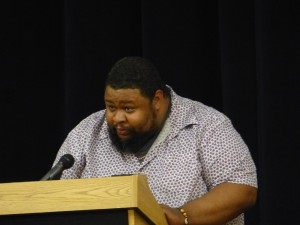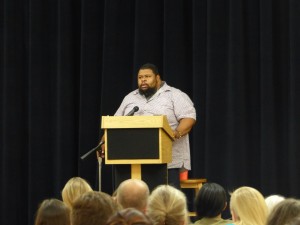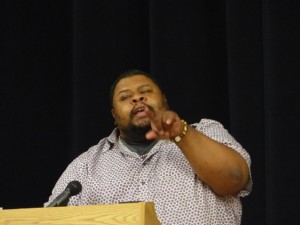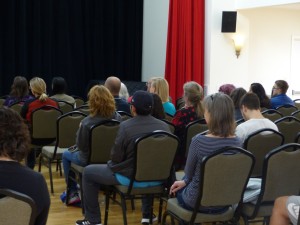“We Don’t Know Our History. Or, At Least We Don’t Want to Admit Where We Are Placed in History.” Michael W. Twitty Comes to Frostburg
Michael W. Twitty is a food writer, independent scholar, culinary historian, and historical interpreter. He is also the author of The Cooking Gene, which won the 2018 James Beard Foundation Book Award for Book of the Year. The Cooking Gene was a finalist for The Kirkus Prize in nonfiction, the Art of Eating Prize and a Barnes and Noble New Discoveries finalist in nonfiction.
Twitty also runs a food blog titled “Afroculinaria,” which covers “food’s critical role in the development and definition of African American civilization and the politics of consumption and cultural ownership that surrounds it” (Afroculinaria).
In one of his recent essays titled, “Dear Disgruntled White Plantation Visitors, Sit Down,” Twitty remarks, “For over a decade I have been working towards my personal goal of being the first Black chef in 150 years to master the cooking traditions of my colonial and Antebellum ancestors. Five trips to six West African nations and more on the way, and having cooked in almost every former slaveholding state beneath the Mason-Dixon line, my work is constant, unrelenting mostly because I have to carve my way through a forest of stereotypes and misunderstandings to bring our heritage to life. I also just want to preserve the roots of our cooking before they’re gone.”
On Thursday, Oct. 10, Twitty hosted an evening reading in the Lyric Theatre on Frostburg’s Main Street.
Jennifer Browne introduced the night, mentioning that Twitty describes himself as an “African American, gay, Jewish, culinary historian.”
“You know, a third of our soldiers during the Civil War, fought for the Confederacy in Maryland. I’m actually not complaining about that, because, had Lincoln not locked up Taney and others, I might not be on this stage for the right reasons. So I’m kinda grateful some past in history happened so I can be up here free, equal, and literate. So, I’m not complaining, I’m just saying we don’t know our history. Or, at least we don’t want to admit where we are placed in history,” Twitty remarked.

“I will say this. Southern history should not be centered in the Civil War. A lot happened before 1860, 1861. And a hell of a lot happened afterwards. And what we do, is we tend to annihilate that history. You’re annihilating other stories that are peculiar to the Southern experience, that happened outside of the boundaries of what people traditionally consider “the South”. Confederacy does not equal the South. Confederacy equals one part of the South. And when you look at those maps in the textbooks, not all of that territory was Confederate territory. There were huge squads of territory where people were just like, “I have no dog in this fight, why are you including me in this?” So, there’s this inaccurate sense of history.”

Twitty added, “But, we do have tenant farming and sharecropping and the legacy of tobacco in this state (Maryland), and you can’t deal with that unless you know the rest of your history. And how those created certain things, or how redlining in Baltimore ultimately came from colonial Antebellum slavery, down through how new immigrant groups related to an Aristocratic plantation system. That’s very complex, a lot of big words. But, the bottom line is, we cannot extract Maryland from the larger story of the American South. To do so, is dishonest and disrespectful to all the people who lived and died in this state.”
Twitty recalled a time he presented at a literary festival in Mississippi.
“My first argument is that to know where my family came from, and to marry that with “I’m interested in food, cooking, etc.” was a big deal. To kind of trace back the Mosaic pieces that allowed me, because African American genealogy is really really hard.”
“Another part is acknowledging how deeply invested Southern culture is from it’s African roots.You can’t extract the two. And for a lot of people, when they hear “Africa,” they still think “Tarzan”, they still think “the Sarengettee”, they still think “the Lion King,” you can’t get “that Africa” out of their heads, the Africa that has no ability to write its own history. The Africa that has no standing on the world stage with other human beings. When, ain’t nobody in this room is free from African ancestry. We all come from there.”
In regards to the Mississippi audience, Twitty recalled, “You realize how much your food culture, music culture and religious culture and even your political culture has been the reaction to people like me. How much of your identity is invested in either anti-blackness, appropriating blackness, or the fact that you have, not even a trickle down, it’s a flood,of African, Afro-Atlantic, and black culture, through the generations, they looked at me like they have never heard this before, couldn’t even conceive of it.”
Twitty went onto mention when he was signing books at this festival after his presentation, he received remarks such as “Well, I used to have a colored nanny.”
The Frostburg audience laughed as Twitty commented on this experience, “What? She was what? Did you use crayons? What was the deal?”
“But I wasn’t upset, I wasn’t so much bothered by that fact than the fact of okay, so how did this African American woman raise you? What did she make y’all for dinner? Was it roast beef and Yorkshires? Or perhaps, was it croissants? Nah, it was okra and some rice and some barbecue and some catfish, wasn’t it? Okay, cool. You know what they eat in Senegal, Nigeria, and Ghana? Catfish. You know what they grow in other countries? Rice.You know where okra comes from? West Africa.”
Twitty further discussed various examples involving food, dance, clothing, music, etc. that plays a role in the American culture as a result of African influence.
“What exactly did you do that didn’t come from black and brown people? Where did Elvis learn to play the guitar from? A black man. Jimmy Rogers? Black man. So what you’re telling me is that, we have a co-created culture, over 400 years, that is European, Native American, and African? That we have been co-created for quite some time, but yet, constantly annihilating the existence and presence of the black woman and man. So, that was my talk to Mississippi.”

“I’ll never forget Paula Deen saying some nonsense about how her grandmother invented her cakes. Bye, Paula.You know your Grandma didn’t invent nothing. Then when they went on Ancestry, and were like yeah, your Great Grandaddy had all these enslaved people, and they did all the cooking. Yeah, the cooking, the cooking, Paula. They did all the cooking. Not your Grandmammy. No, it was, us, black people. You’re still stealing recipes, Paula. I don’t know if you know this, but, the lady who actually did all the recipes for her restaurants and her own cookbook, that’s where Paula got them from.”
“But that’s why I said what I said because I want people to understand. There’s all these amazing black chefs and they’re not just doing something for the soul food, they’re doing everything you don’t take pictures of. Cause you’re so interested in investment, making Paula Deen and Paul Prudhomme and Tyler Florence the faces of Southern foods; the multi-billion dollar industry that our ancestors created. And then you tell us we have no heritage, we don’t come from nothing, if only we would just assimilate and get rid of our civilization, everything would just be great for us. When clearly, that would not work. I mean, aren’t y’all grateful that you don’t listen to Lawrence Wilke and the polka everyday? Cause, I’m tellin’ you, America without black people is scary as hell.” The audience laughed and nodded, agreeing with Twitty.

Twitty talked about his various trips to West Africa, mentioning their food traditions
“It’s really hard to talk about the food, without talking about the politics and economy and gender issues, etc. that go along with it. A cookbook isn’t just a cookbook. Food stories aren’t just food stories. It’s free food just runnin’ around, right? And food can be tasty in the right hands. But, it also tells the story of the first person who came up and goes, “You know what? We’re gonna eat that.” And then, the person makes the gravy for it, and there’s a lot of love. With people, love and emotion often accompany food. But, what if you’re enslaved? What if you lived that life? What if you’re exiled? How do you use food to tell about love in a space where there’s not much love? What do you do with yourself?”
“Where do I come from? After years of people going, “Well, you know, Michael, we’re all African Americans.” Okay, you can keep that. Or, “I’m South African, that makes me an African American.” Actually, baby it don’t. Or, “Why do we have to say African, why not just Americans?” You’re separating yourself. I grew up with Baltimore ethnic folks, New York ethnic folks, and Jersey ethnic folks. They had no problem saying to the world, “We’re Greek, we’re Polish, we’re Italian,e etc.” Fine, that’s cool. That’s cool. But, where do I fit in all of this? So, that was a big question. Growing up in suburban Maryland with a lot of different ethnic groups, trying to figure myself out in that space was very important. But, I also realized what the hallmarks of the culture were: words, recipes, language. When you step into someone’s house, you pick up on the little pieces of their culture. It’s not just the food itself, it’s the sociological architecture around the food.”
“Food history is fun. It challenges you, it makes you respect cultures, respect people, respect women who otherwise, would not have a name in history.”
Twitty talked about heartbreaking stories involving the slave trade and slavery in the U.S.
“This is what soul food and our spirituality and our food is all about. Our tradition is about our migrations, our pain, our suffering. But, it’s also about our survival, our happiness, and our love for each other.”
“Food is how I chose to look at the connective tissue through all these different parts.”



